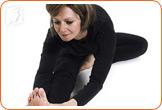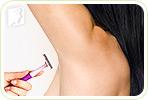Waking up at all hours of the night, drenched in sweat? Losing sleep because your feel as though you are burning up whenever you try to get some shut eye? Tossing and turning because menopausal night sweats won't let you get comfortable? Does this sound like your nocturnal experiences? If so, check out these four easy lifestyle changes that can help you fight night sweats and get a good night's sleep.
Avoid Exercise Before Bed

Most menopause articles will tell you what an important part exercise plays in your overall well-being, and it does. But, if you are exercising within a few hours of your normal bedtime, you are likely to induce night sweats. All the excess energy and exertion will lead to more frequent and severe night sweats. Make sure you are getting all your exercise in before 5 p.m to ensure a restful night's sleep.
Avoid Spicy Foods
Spicy foods can make you sweaty and uncomfortable right after you eat, and even up to hours afterwards. If you are really craving something spicy, try to indulge in it over lunch, and keep your dinner cooler and blander to avoid the uncomfortable side effects of spicy foods.
Avoid Long Baths

As tempting as it can be to take a long bubble bath after a particularly stressful day, this can raise your body's temperature right before you try to doze off. Instead try a warm shower; this will leave you nice and toasty, without causing the overheating that can come from siting in a bathtub. If you're suffering during the summer months try to take a lukewarm shower instead. This will cool you down and keep you that way throughout the night.
Avoid Cleaning
Similar to working out, energetic cleaning can get your heart rate up, and keep it that way when you are trying to get some shut eye. You may not have ever thought of cleaning as something that requires physical exertion, but it does. Vacuuming, dusting, and lugging around laundry can keep your heart rate and your temperature high. Share the load with your family or housemates and try to get your bit done earlier in the day. Leave time for yourself right before going to sleep.
Click on the following link if you want to learn more about how you can treat your night sweats.
Sources
- The National Institute of Health.(n.d). "Signs of the Menopausal Transition" Retrieved from www.nih.gov
- Boston Women's Health Collective. "Hot Flashes, Night Sweats and Sleep Disturbances". Our Bodies, Ourselves, 2006.
- Von Muhlen, DG, et al. "A community-based study of menopause symptoms and estrogen replacement in older women". Maturitas. Sept 1995; 22(2):71-8.


